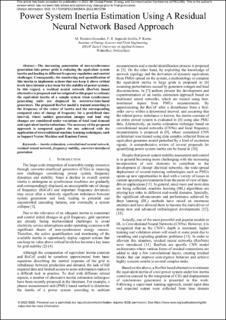Please use this identifier to cite or link to this item:
https://doi.org/10.21256/zhaw-25336| Publication type: | Conference paper |
| Type of review: | Peer review (publication) |
| Title: | Power system inertia estimation using a residual neural network based approach |
| Authors: | Ramirez Gonzalez, Miguel Segundo Sevilla, Felix Rafael Korba, Petr |
| et. al: | No |
| DOI: | 10.1109/GPECOM55404.2022.9815784 10.21256/zhaw-25336 |
| Proceedings: | Proceedings of IEEE GEPCOM 2022 |
| Page(s): | 355 |
| Pages to: | 360 |
| Conference details: | 4th Global Power, Energy and Communication Conference (GPECOM), Cappadocia, Turkey, 14-17 June 2022 |
| Issue Date: | 2022 |
| Publisher / Ed. Institution: | IEEE |
| Publisher / Ed. Institution: | New York |
| ISBN: | 978-1-6654-6925-8 |
| Language: | English |
| Subjects: | Inertia estimation; Convolutional neural network; Residual neural network; Frequency stability; Converter-interfaced generation |
| Subject (DDC): | 006: Special computer methods 621.3: Electrical, communications, control engineering |
| Abstract: | The increasing penetration of non-synchronous generation into power grids is reducing the equivalent system inertia and leading to different frequency regulation and control challenges. Consequently, the monitoring and quantification of this inertia to implement actions that can keep it above critical levels have become a key issue for the stability of power systems. In this regard, a residual neural network (ResNet) based alternative is proposed and investigated in this paper to estimate the equivalent inertia of a sample system when synchronous generating units are displaced by converter-interfaced generators. The proposed ResNet model is trained according to the frequency of the center of inertia and the corresponding computed rates of change of frequency for a predefined time interval, where sudden generation outages and load step changes are considered under variations of total load demand and equivalent inertia reductions. The accuracy of the proposed approach is compared against the one achieved with the application of two traditional machine learning techniques, such as Support Vector Machine and Random Forest. |
| URI: | https://digitalcollection.zhaw.ch/handle/11475/25336 |
| Fulltext version: | Accepted version |
| License (according to publishing contract): | Licence according to publishing contract |
| Departement: | School of Engineering |
| Organisational Unit: | Institute of Energy Systems and Fluid Engineering (IEFE) |
| Appears in collections: | Publikationen School of Engineering |
Files in This Item:
| File | Description | Size | Format | |
|---|---|---|---|---|
| 2022_Ramirez-etal_Power-system-inertia-estimation_IEEE.pdf | Accepted Version | 647.21 kB | Adobe PDF |  View/Open |
Show full item record
Ramirez Gonzalez, M., Segundo Sevilla, F. R., & Korba, P. (2022). Power system inertia estimation using a residual neural network based approach [Conference paper]. Proceedings of IEEE GEPCOM 2022, 355–360. https://doi.org/10.1109/GPECOM55404.2022.9815784
Ramirez Gonzalez, M., Segundo Sevilla, F.R. and Korba, P. (2022) ‘Power system inertia estimation using a residual neural network based approach’, in Proceedings of IEEE GEPCOM 2022. New York: IEEE, pp. 355–360. Available at: https://doi.org/10.1109/GPECOM55404.2022.9815784.
M. Ramirez Gonzalez, F. R. Segundo Sevilla, and P. Korba, “Power system inertia estimation using a residual neural network based approach,” in Proceedings of IEEE GEPCOM 2022, 2022, pp. 355–360. doi: 10.1109/GPECOM55404.2022.9815784.
RAMIREZ GONZALEZ, Miguel, Felix Rafael SEGUNDO SEVILLA und Petr KORBA, 2022. Power system inertia estimation using a residual neural network based approach. In: Proceedings of IEEE GEPCOM 2022. Conference paper. New York: IEEE. 2022. S. 355–360. ISBN 978-1-6654-6925-8
Ramirez Gonzalez, Miguel, Felix Rafael Segundo Sevilla, and Petr Korba. 2022. “Power System Inertia Estimation Using a Residual Neural Network Based Approach.” Conference paper. In Proceedings of IEEE GEPCOM 2022, 355–60. New York: IEEE. https://doi.org/10.1109/GPECOM55404.2022.9815784.
Ramirez Gonzalez, Miguel, et al. “Power System Inertia Estimation Using a Residual Neural Network Based Approach.” Proceedings of IEEE GEPCOM 2022, IEEE, 2022, pp. 355–60, https://doi.org/10.1109/GPECOM55404.2022.9815784.
Items in DSpace are protected by copyright, with all rights reserved, unless otherwise indicated.